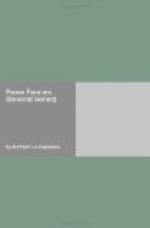It is full time we turned to those on whom falls the burden of those real parts. Such, when quite young, if they be conscientious artists, will carefully consider themselves, their gifts and possibilities, study to discover their artistic raison d’etre and how best to fulfil it. He or she will say: Here am I, a creature of great gifts and exquisite sensibilities, drawn by great dreams, and vibrating to great emotions; yet this potent and exquisite self is as yet, I know, but unwrought material of the perfect work of art it is intended that I should make of it—but the marble wherefrom, with patient chisel, I must liberate the perfect and triumphant ME! As a poet listening with trembling ear to the voice of his inspiration, so I tremulously ask myself—what is the divine conception that is to become embodied in me, what is the divine meaning of ME? How best shall I express it in look, in word, in deed, till my outer self becomes the truthful symbol of my inner self—till, in fact, I have successfully placed the best of myself on the outside —for others besides myself to see, and know and love?
What is my part, and how am I to play it?
Returning to the latter image, there are two difficulties that beset one in playing a part on the stage of life, right at the outset. You are not allowed to ‘look’ it, or ‘dress’ it! What would an actor think, who, asked to play Hamlet, found that he would be expected to play it without make-up and in nineteenth-century costume? Yet many of us are in a like dilemma with similar parts. Actors and audience must all wear the same drab clothes and the same immobile expression. It is in vain you protest that you do not really belong to this absurd and vulgar nineteenth century, that you have been spirited into it by a cruel mistake, that you really belong to mediaeval Florence, to Elizabethan, Caroline, or at latest Queen Anne England, and that




